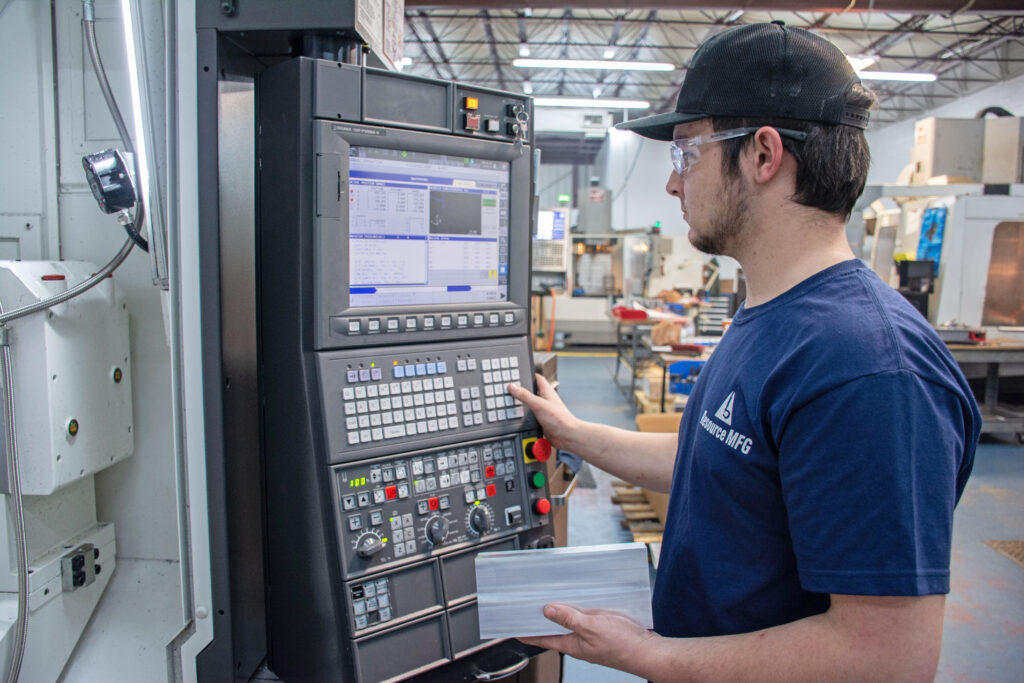What is a CNC machinist?
Computer numerical control (CNC) machinists play a crucial role in the manufacturing industry today, as they’re responsible for cutting, shaping, and refining raw materials into finished products. In an increasingly digital world where organizations continue to move toward innovative technologies, the ideal time to learn how to become a machinist is now.
We’re exploring the responsibilities and qualifications required for a profession as a CNC machinist, and how experienced partners can help you kickstart your career in the field.
Let’s take a deeper look at what a CNC machinist is
CNC machinists rely on their expertise and skill to create accurate products by operating CNC machines. That means, as long as the production of tools and parts relies on computer programs, CNC machinists will continue to be in high demand.
CNC machinists are essential for producing components that meet industry standards and handle heavy machinery used for making metal and plastic components, typically working in industries like aerospace, automotive, power, and manufacturing.
Some of the primary duties and responsibilities of CNC machinists include:
- Setting up, programming, and operating CNC machines to perform tasks like milling, drilling, and grinding
- Converting instructions into computer commands, so machines can execute their intended tasks
- Monitoring machine performance and adjusting as needed
- Performing quality control checks by inspecting finished products for precision
- Troubleshooting and addressing machine issues as they arise
- Maintaining compliance with all industry standards and safety regulations

What’s the difference between a CNC machinist and a CNC operator?
In some organizations, the roles of a CNC machinist and a CNC operator are interchangeable. However, a CNC operator is generally considered an entry-level position. If you don’t have experience in the industry, you might start your journey as an operator, primarily handling materials, running machines, and ensuring instructions are followed to meet product specifications.
A CNC machinist is regarded as a more advanced role, where individuals should be capable of precisely handling parts using various machines and techniques. Taking on more responsibility as a machinist often requires skills attained through an accredited trade school or years of on-the-job experience.
The qualifications required for CNC machinists
Interested in a career as a CNC machinist? If you have an affinity for computers, problem-solving, and have a keen eye for small details, this could be an ideal match for you. It’s a role that calls for someone with creative passion for crafting and production and great time management skills.
Furthermore, CNC machinists need to be adaptable and collaborative, as you’ll be working with engineers, managers, quality control experts, and other stakeholders along the way. Lastly, because reading blueprints is a big part of the job, math skills are essential to being a successful machinist.
Is a bachelor’s degree or license required to become a CNC machinist?
Typically, you don’t need a bachelor’s degree to jump-start your career as a machinist. However, organizations will likely ask for a high school diploma or GED, along with some specialized training before you can get started.
There are no strict licensing requirements to be a CNC machinist, but it can be beneficial for your job prospects if you decide to earn an official certification such as one of the National Institute for Metalworking Skills (NIMS) certifications or certifications from machine manufacturers for specific equipment. What’s more, individual workplaces can mandate whether CNC machinists must be licensed on their machinery to maintain a safe working environment.
The job outlook and average salary for CNC machinists
Fortunately, if you’ve been considering a career as a CNC machinist, the job outlook is positive. The U.S. The Bureau of Labor Statistics (BLS) projects about 44,100 openings for machinists each year, on average, over the decade — mainly replacing workers who change careers or exit the labor force.
As technologies improve and are increasingly implemented, from CNC machine tools to high-speed machining, skilled CNC machinists will be in high demand to launch, monitor, and maintain these automated systems.
Keep in mind that the level of employment for CNC machinists is also influenced by economic cycles and the location of the job. The BLS reports that states like California, Ohio, and Michigan currently have the highest employment rates for machinists.
How much can a CNC machinist earn?
CNC machinists have a median annual wage of $47,430, according to the Bureau of Labor Statistics. However, some areas offer significantly higher salaries such as the District of Colombia, at up to $75,240 and Hawaii at $75,060, according to BLS report from 2022.
Ultimately, your location, experience, education, company size, market, and industry are all critical factors that determine how much you’ll be able to earn as a CNC machinist.
Start your career as a CNC machinist
As technology continues to advance in the manufacturing industry, the future looks promising for CNC machinists. The growing demand for their expertise will become increasingly integral to production processes, shaping the future of manufacturing altogether.
If you’re interested in embarking on a rewarding career as a CNC machinist, ResourceMFG is here to help you unlock your potential. At ResourceMFG, we’re committed to championing talent and helping you find work that’s the right fit for your expectations and experiences.
Ready to kick-start your career as a CNC machinist? Explore all the career opportunities available at ResourceMFG, or contact your local branch to learn more about how we can help you.